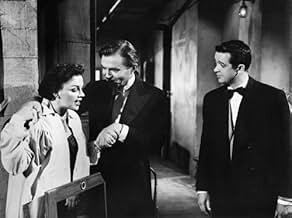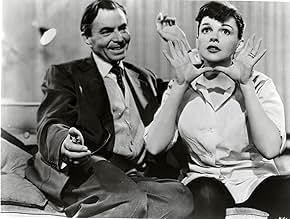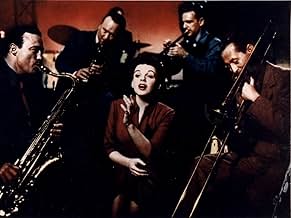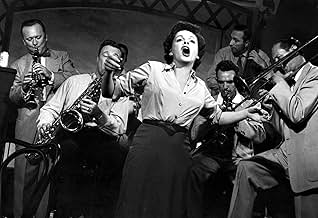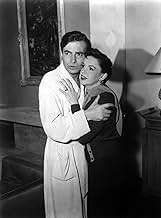IMDb रेटिंग
7.5/10
21 हज़ार
आपकी रेटिंग
अपनी भाषा में प्लॉट जोड़ेंA fading matinee idol helps a young singer and actress find fame, even as age and alcoholism send his own career on a downward spiral.A fading matinee idol helps a young singer and actress find fame, even as age and alcoholism send his own career on a downward spiral.A fading matinee idol helps a young singer and actress find fame, even as age and alcoholism send his own career on a downward spiral.
- 6 ऑस्कर के लिए नामांकित
- 7 जीत और कुल 14 नामांकन
Tommy Noonan
- Danny McGuire
- (as Tom Noonan)
John Alban
- Academy Awards Attendee
- (बिना क्रेडिट के)
Laurindo Almeida
- Guitarist
- (बिना क्रेडिट के)
Leon Alton
- Usher
- (बिना क्रेडिट के)
Rudolph Anders
- Mr. Ettinger
- (बिना क्रेडिट के)
David Armstrong
- Soundman
- (बिना क्रेडिट के)
Phil Arnold
- Agent #3
- (बिना क्रेडिट के)
Nadine Ashdown
- Esther - Age 6
- (बिना क्रेडिट के)
Gertrude Astor
- Racetrack Spectator
- (बिना क्रेडिट के)
फ़ीचर्ड समीक्षाएं
Marked by a pervasive sense of melancholy, the 1954 musical version of the familiar Hollywood warhorse will forever be remembered as Judy Garland's most acclaimed work in films. Even though she would go on to a handful of films in the early 1960's, this was her last leading role in a major Hollywood production, an ironic point since she plays an emerging movie star on the rise. True, she doesn't look her best in the film, but her fulsome talent is on full, heart-wrenching display as Esther Blodgett, an obscure but thriving band singer who becomes movie star Vicki Lester thanks to Norman Maine, an alcoholic has-been movie star in career free-fall. Their love story and the opposing trajectories of their careers are tracked meticulously by Moss Hart's shrewdly observed screenplay and George Cukor's sensitive direction.
The double-sided 2000 DVD provides the 176-minute restored version, which is just five minutes less than what was shown at the original premiere. Until 1983, the half-hour of footage excised after the premiere was thought lost, but film historian Ron Haver found much of it and supervised an extraordinary restoration effort that includes a necessary albeit brief use of production stills to match up with the complete soundtrack. Even with such technicalities, the resulting film is even more of a landmark musical drama, emotionally resonant in spite of certain pacing issues with the storyline. Cukor's approach is probably more leisurely than the relatively hard-boiled material requires since he includes so many establishing and lengthy shots, but his direction shows his legendary sensitivity toward actors.
While he comes across a bit too robust as a fading matinée idol, James Mason vigorously captures Norman's scornful pride and self-pity. He may lack Fredric March's innate sense of vulnerability in the original, but Mason makes the character's inner torment more palpable. As for Garland, she brings so much of her own history to Esther/Vicki that her scenes feel alive with her vibrant, masochistic personality. She is aided immeasurably by the masterful songs of Harold Arlen and Ira Gershwin, most significantly her torchy rendition of "The Man That Got Away", as perfect a musical movie moment as has been ever produced. While her work in the fifteen-minute "Born in the Trunk" sequence is impressive, it is really later in the film when she soars, in particular, when she segues from the tap-happy "Lose That Long Face" into a breakdown scene in her dressing room with sympathetic studio head Oliver Niles portrayed with his typically stentorian fervor by Charles Bickford.
The print condition and sound quality on the DVD are superb. There are also some fascinating extras on the B-side starting with three alternative takes on "The Man That Got Away", each distinctive in presentation with costume and lighting changes, a must for Garland fans. Also included is a very brief deleted number within the "Born in the Trunk" sequence", "When My Sugar Walks Down the Street". Three vintage pieces have been gathered - a brief newsreel piece of the premiere, a four-minute clip of the Coconut Grove premiere party held after the premiere, and most interestingly, a half-hour kinescope akin to the current-day red carpet pre-shows with an amazing parade of period stars expressing little more than good wishes on their way to the theater. Lastly, the theatrical trailers for all three versions of "A Star Is Born" are also included.
The double-sided 2000 DVD provides the 176-minute restored version, which is just five minutes less than what was shown at the original premiere. Until 1983, the half-hour of footage excised after the premiere was thought lost, but film historian Ron Haver found much of it and supervised an extraordinary restoration effort that includes a necessary albeit brief use of production stills to match up with the complete soundtrack. Even with such technicalities, the resulting film is even more of a landmark musical drama, emotionally resonant in spite of certain pacing issues with the storyline. Cukor's approach is probably more leisurely than the relatively hard-boiled material requires since he includes so many establishing and lengthy shots, but his direction shows his legendary sensitivity toward actors.
While he comes across a bit too robust as a fading matinée idol, James Mason vigorously captures Norman's scornful pride and self-pity. He may lack Fredric March's innate sense of vulnerability in the original, but Mason makes the character's inner torment more palpable. As for Garland, she brings so much of her own history to Esther/Vicki that her scenes feel alive with her vibrant, masochistic personality. She is aided immeasurably by the masterful songs of Harold Arlen and Ira Gershwin, most significantly her torchy rendition of "The Man That Got Away", as perfect a musical movie moment as has been ever produced. While her work in the fifteen-minute "Born in the Trunk" sequence is impressive, it is really later in the film when she soars, in particular, when she segues from the tap-happy "Lose That Long Face" into a breakdown scene in her dressing room with sympathetic studio head Oliver Niles portrayed with his typically stentorian fervor by Charles Bickford.
The print condition and sound quality on the DVD are superb. There are also some fascinating extras on the B-side starting with three alternative takes on "The Man That Got Away", each distinctive in presentation with costume and lighting changes, a must for Garland fans. Also included is a very brief deleted number within the "Born in the Trunk" sequence", "When My Sugar Walks Down the Street". Three vintage pieces have been gathered - a brief newsreel piece of the premiere, a four-minute clip of the Coconut Grove premiere party held after the premiere, and most interestingly, a half-hour kinescope akin to the current-day red carpet pre-shows with an amazing parade of period stars expressing little more than good wishes on their way to the theater. Lastly, the theatrical trailers for all three versions of "A Star Is Born" are also included.
Count me among those who love this film, but am I the only one who feels for Libby, played by Jack Carson? Yes, he's snide and spiteful, but for God's sake, who wouldn't be in his shoes? When he says, "Norman Maine's charm escapes me." I tend to agree with him. What makes this violent drunk so special anyway, except that he's played by James Mason? And, although she's played by Judy Garland at her radiant best, isn't Esther a classic co-dependent wife? Have any of you adoring fans ever actually dealt with a close one who's alcoholic?
When the studio mogul says, after Norman Maine dies, "you didn't know him at all," I feel like arguing the point. Libby should say, "Maybe YOU didn't know him, Oliver. Did he ever insult you for making him do his job? Did he ever punch you out? Did you ever have to continually face his dirty side, as I did, which he--and you too, Oliver--refused to confront?"
Maybe I'm a poop. But I had to say it.
And, yes, it's a brilliant film.
When the studio mogul says, after Norman Maine dies, "you didn't know him at all," I feel like arguing the point. Libby should say, "Maybe YOU didn't know him, Oliver. Did he ever insult you for making him do his job? Did he ever punch you out? Did you ever have to continually face his dirty side, as I did, which he--and you too, Oliver--refused to confront?"
Maybe I'm a poop. But I had to say it.
And, yes, it's a brilliant film.
Is it possible to watch this fictional story without digressing to thoughts about the real life story of Judy Garland? For me it isn't. Both are permanently intertwined. And it's not just the parallel between fiction and fact, but also the dark, brooding, melancholy mood they engender, like ghosts calling out to us from a Hollywood that no longer exists.
The film's storyline is well known. I won't belabor it here, except to say that it communicates an honest and introspective indictment of the entertainment industry as it once was. The story can be thought of as a kind of archetypal Hollywood memoir, expressed as a musical.
But musicals are supposed to be upbeat, lighthearted, fun. This one isn't. Moments of humor and joy are swept away in a cascade of emotional pain and tragedy. Fiction mimics real life. How appropriate that the film's signature song "The Man That Got Away" is one that is so uncompromisingly serious, poignant, and smoldering ... a perfect vehicle for Judy Garland.
Some say she had the greatest singing voice of any entertainer in the twentieth century. This film lends credence to that assertion. Every song she sings is performed with such consummate verve, such emotional commitment that she seems to be singing not just for her contemporaries, but also for generations to come. Indeed, she is. My personal favorite is the "Born In A Trunk" segment, all fifteen minutes of it. Surrounded by sets of true cinematic art, she belts out one tune after another, including, of course, the poignant "Melancholy Baby".
Judy's singing and the music itself are what make the movie so memorable. But she also demonstrates her considerable acting talent. And the acting of other cast members is fine, especially the performances of James Mason and Jack Carson. I do think that the film was, and still is, too long, the result of an overly ambitious screenplay.
That Judy Garland was denied the Best Actress Oscar is poignant. But her talent was so massive, her uniqueness was so special, maybe fate required a compensatory level of pain and tragedy, as a prerequisite of legend.
The film's storyline is well known. I won't belabor it here, except to say that it communicates an honest and introspective indictment of the entertainment industry as it once was. The story can be thought of as a kind of archetypal Hollywood memoir, expressed as a musical.
But musicals are supposed to be upbeat, lighthearted, fun. This one isn't. Moments of humor and joy are swept away in a cascade of emotional pain and tragedy. Fiction mimics real life. How appropriate that the film's signature song "The Man That Got Away" is one that is so uncompromisingly serious, poignant, and smoldering ... a perfect vehicle for Judy Garland.
Some say she had the greatest singing voice of any entertainer in the twentieth century. This film lends credence to that assertion. Every song she sings is performed with such consummate verve, such emotional commitment that she seems to be singing not just for her contemporaries, but also for generations to come. Indeed, she is. My personal favorite is the "Born In A Trunk" segment, all fifteen minutes of it. Surrounded by sets of true cinematic art, she belts out one tune after another, including, of course, the poignant "Melancholy Baby".
Judy's singing and the music itself are what make the movie so memorable. But she also demonstrates her considerable acting talent. And the acting of other cast members is fine, especially the performances of James Mason and Jack Carson. I do think that the film was, and still is, too long, the result of an overly ambitious screenplay.
That Judy Garland was denied the Best Actress Oscar is poignant. But her talent was so massive, her uniqueness was so special, maybe fate required a compensatory level of pain and tragedy, as a prerequisite of legend.
In a career of classic performances this may be Judy Garland's best role and one that certainly uses her many talents to the hilt. James Mason gives an Oscar caliber performance as well and I believe in almost any other year that he wasn't up against Brando's "On the Waterfront" performance he would and should have won.
This George Cukor film features gorgeous color and beautiful cinematography, but does suffer from choppy editing that may be the result of restored footage. The project to restore over an hour of missing footage scrapped by the producers after the original length was in excess of four and a half hours may have been done with the best intentions, but is still incomplete and leaves the film disjointed and obviously lacking. I certainly wish the original footage was never scrapped, but this spotty attempt at restoration makes you feel like your watching more of a project than a classic film. Sometimes less is more and definitely in this case.
Whatever you do make sure you see the widescreen version of this film that was originally shot in Cinemascope or you will only see about a third of the actual picture and I assure you, you won't want to miss any of it.
This George Cukor film features gorgeous color and beautiful cinematography, but does suffer from choppy editing that may be the result of restored footage. The project to restore over an hour of missing footage scrapped by the producers after the original length was in excess of four and a half hours may have been done with the best intentions, but is still incomplete and leaves the film disjointed and obviously lacking. I certainly wish the original footage was never scrapped, but this spotty attempt at restoration makes you feel like your watching more of a project than a classic film. Sometimes less is more and definitely in this case.
Whatever you do make sure you see the widescreen version of this film that was originally shot in Cinemascope or you will only see about a third of the actual picture and I assure you, you won't want to miss any of it.
Who would have thought? Cukor, never having worked in colour before AND never having worked in widescreen before did the best piece of work of his career here. 'The Man That Got Away' is always considered one of the best musical numbers to come out of old Hollywood: but wait until you've seen it in widescreen. It's not even the same number, and you get why people who've seen this film in theatres revere the number. Some of the compositions (especially during the opening set piece) aren't just Cukor's best work, they rival anyone's from that era. Let me reitierate: see it in widescreen or trust those of us who have. This musical/ melodrama/tragedy set the bar so high that 50 years later people remember this film but not the musical that got a best picture nomination that year, OR, the performance that won Best Actress that year.
क्या आपको पता है
- ट्रिवियाGeorge Cukor offered Marlon Brando the role of Norman Maine on the set of Julius Caesar (1953). "Why would you come to me?" asked Brando. "I'm in the prime of my life... If you're looking around for some actor to play an alcoholic has-been, he's sitting right over there"- pointing at his costar James Mason, who got the part.
- गूफ़After Vicki comes home and she performs in her house for Norman, the doorbell rings and he goes to the door to accept a package for Vicki. His hair is all mussed-up when he goes to the door, but after he closes it and the camera goes back to him, there isn't a hair out of place. Then he walks over to where Vicki is and his hair is all mussed-up again.
- भाव
[last lines]
Vicki Lester: Hello, everybody. This is Mrs. Norman Maine.
- इसके अलावा अन्य वर्जनContrary to popular belief, the film was not originally at 181 minutes, but rather 196 (3hrs. and 16mins.) at a post-premiere shown on August 8, 1954 in Huntington Park, California. After its second post-premiere - the very next day - two scenes of 15 minutes total were deleted; making the film run its original world debut length at 181 minutes. One was a number called "When My Sugar Walks Down the Street" that came after Judy's take of "I'll Get By" in the 'Born in the Trunk' sequence, the other was a scene where Garland and James Mason's characters (Vicki and Norman) were picnicking on the beach; production stills and promotional advertisements are the only thing left in existence of the footage. After its world premiere on September 29, 1954, 27 minutes was cut, bringing it down to a mediocre 154 time length. Those scenes were:
- 1) Esther quitting the band
- 2) The Trinidad Coconut Oil Shampoo
- 3) Esther working at a drive-in
- 4) Norman being driven away drunk in his car
- 5) Norman inquiring Esther's old landlady
- 6) Spotting Esther on the TV commercial
- 7) Tracking down Esther at her new boarding residence
- 8) Driving down the strip - Esther getting sick
- 9) "Here's What I'm Here For" musical number - Norman proposes
- 10) "Lose That Long Face" musical number - Vicki breaks down
- कनेक्शनFeatured in Film Night: Special: Forty Years in Hollywood (1970)
- साउंडट्रैकGotta Have Me Go with You
(uncredited)
Music by Harold Arlen
Lyrics by Ira Gershwin
Performed by Judy Garland with Jack Harmon & Don McKay
टॉप पसंद
रेटिंग देने के लिए साइन-इन करें और वैयक्तिकृत सुझावों के लिए वॉचलिस्ट करें
विवरण
- रिलीज़ की तारीख़
- कंट्री ऑफ़ ओरिजिन
- भाषा
- इस रूप में भी जाना जाता है
- Nace una estrella
- फ़िल्माने की जगहें
- उत्पादन कंपनी
- IMDbPro पर और कंपनी क्रेडिट देखें
बॉक्स ऑफ़िस
- बजट
- $50,19,770(अनुमानित)
- US और कनाडा में सकल
- $43,35,968
- दुनिया भर में सकल
- $43,50,001
- चलने की अवधि
- 2 घं 34 मि(154 min)
- पक्ष अनुपात
- 2.55 : 1
इस पेज में योगदान दें
किसी बदलाव का सुझाव दें या अनुपलब्ध कॉन्टेंट जोड़ें








